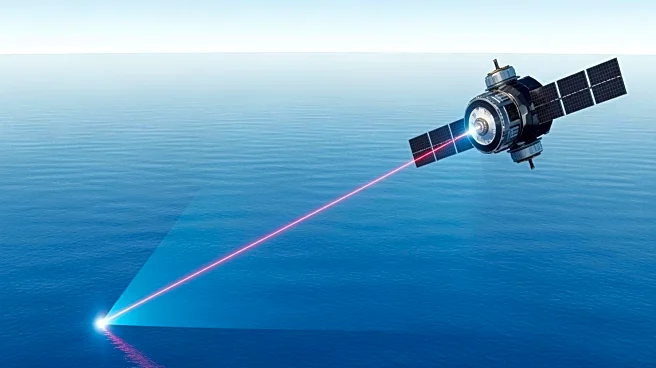What's Happening?
NATO has successfully tested a new laser-based communication system, POLARIS, developed by Astrolight, a Lithuanian space and defense technology company. This system was tested during REPMUS 2025, NATO's
largest annual naval exercise, and demonstrated its capability to establish a secure, unjammable, and undetectable communication link between ships over a 9-mile range. The POLARIS system, which weighs about 35 pounds, converts data into a binary format transmitted as a light signal, allowing for secure communication even in challenging weather conditions. The Lithuanian Navy, a key customer, expressed satisfaction with the results, which included the successful processing of gigabytes of data for multiple real-time HD video streams.
Why It's Important?
The successful testing of POLARIS represents a significant advancement in secure military communications, particularly in the context of increasing GPS jamming attacks in NATO territories. This technology offers a reliable alternative to traditional radio-frequency-based systems, enhancing the security and effectiveness of naval operations. The ability to maintain secure communications in adverse conditions is crucial for military strategy and operations, potentially giving NATO forces a tactical advantage. The development also underscores the importance of innovation in defense technology, as NATO continues to adapt to evolving security threats.
What's Next?
Following the successful test, Astrolight plans to expand the use of POLARIS terminals on more naval vessels. The company is also exploring the potential application of similar systems in harsh environments like the Arctic. Additionally, Astrolight is preparing for the launch of ATLAS-2, an optical terminal designed to support satellite communications, scheduled for early 2026. These developments could further enhance NATO's communication capabilities and strategic operations in various environments.
Beyond the Headlines
The introduction of laser-based communication systems like POLARIS could have broader implications beyond military use. Such technology might eventually be adapted for civilian maritime operations, enhancing communication security and efficiency. Furthermore, the success of POLARIS could stimulate further research and development in optical communication technologies, potentially leading to innovations in other fields such as space exploration and remote sensing.











